
The proportion of Americans who favor gay marriage has increased by 21 points since 1996, from 27% to 48%. Over this period, opposition has fallen from 65% to 44%.
Strong support for gay marriage now equals strong opposition (22% strongly favor, 23% strongly oppose). As recently as four years ago, twice as many strongly opposed as strongly favored gay marriage (30% vs. 14%). In 1996, 41% strongly opposed gay marriage while only 6% strongly favored it.
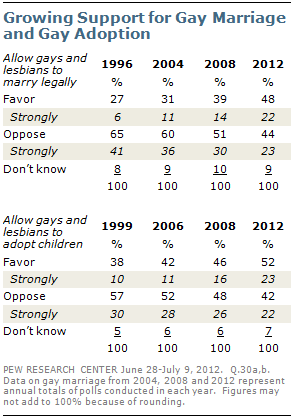
There also has been a steady increase in support for allowing gays and lesbians to adopt children. In 1999, just 38% favored gay adoption while 57% were opposed. Today, 52% favor gay adoption while 42% are opposed.
Views of Gay Marriage
The issue of gay marriage remains a polarizing one across the political spectrum. Among conservative Republicans, an overwhelming majority (78%) opposes gay marriage. By contrast, a wide majority of liberal Democrats (83%) favor allowing gays and lesbians to marry legally. Views of independents, and moderates in both parties, are more mixed.

Six-in-ten college graduates support allowing gays to marry (60%), compared with 51% of those with some college experience and 38% of those with no more than a high school education. (For long-term trends on views of gay marriage, based on yearly totals, see “Changing Attitudes on Gay Marriage”.)
Just 22% of white evangelical Protestants favor gay marriage while 73% oppose it. By comparison, there is more support (50%) than opposition (40%) among white mainline Protestants. Nearly six-in-ten white non-Hispanic Catholics (59%) favor allowing gays and lesbians to marry, as do 57% of Hispanic Catholics.

About four-in-ten black Protestants (38%) favor allowing gays and lesbians to marry legally, while more than half (54%) are opposed.
People who have no religious affiliation favor gay marriage by 72% to 20%. Among atheists and agnostics, an overwhelming majority (88%) supports gay marriage; just 6% are opposed. Among those who describe their religion as nothing in particular, 65% support gay marriage and 26% are opposed.
Generally, those with high levels of religious commitment oppose gay marriage. Nearly two-thirds (65%) of those who attend religious services at least weekly oppose allowing gays and lesbians to marry, as do 59% of those who say religion is very important in their lives. There is far more support for gay marriage among those who attend services less frequently and those who say religion is less personally important.
Views of Gay Adoption
Like support for gay marriage, support for allowing gays and lesbians to adopt children has increased in recent years. There has been a 10-point increase in support since July 2006 (when 42% of the population supported allowing gays to adopt and 52% were opposed). Since 1999 there has been a 14-point increase in support.

In many ways divisions in views about gay adoption mirror those of gay marriage. Both parties are split over allowing gays and lesbians to adopt children. While 85% of liberal Democrats favor gay adoption, 55% of conservative and moderate Democrats do so. Among Republicans, moderates and liberals are at least twice as likely as conservatives to favor gay adoption (53% vs. 23%).
More women than men favor gay adoption (57% vs. 46%). And gay adoption is supported by more of those younger than 30 (67%) than any other age group.
As with gay marriage, whites are more likely than African Americans to favor allowing gays to adopt (54% vs. 43%). However, while Hispanics are more likely to support gay marriage than to oppose it, they are roughly evenly divided regarding gay adoption, with 44% in favor and 48% opposed.
Three-in-ten white evangelicals (30%) support allowing gay adoption, but twice as many (65%) oppose it. Among white mainline Protestants, about half support allowing gays to adopt (53%). Somewhat fewer white mainline Protestants (40%) oppose it.

Among Catholics there is a sharp split along ethnic lines. Nearly two thirds of white Catholics (63%) support allowing gays to adopt and fewer than one third (30%) oppose the practice. By contrast, less than half of Hispanic Catholics (40%) support allowing gays to adopt.
A majority of people who say religion is very important in their lives oppose allowing gay and lesbian couples to adopt (55%), while about one-in-four (23%) people who say religion is less than very important oppose this.
There is considerable overlap between support for allowing gays and lesbians to marry legally and allowing them to adopt children. People who believe that gays and lesbians should be allowed to marry legally also tend to believe gay and lesbians should be allowed to adopt children. And people who oppose allowing gays and lesbians to marry often also oppose allowing them to adopt. In fact, three quarters of the public either favors both (41%) or opposes both (34%) of these practices.

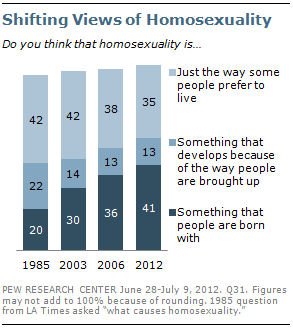
Today, a plurality of Americans (41%) believe that homosexuality is something that people are born with. A slightly smaller portion (35%) believes it is just how some people prefer to live, and a minority (13%) thinks it develops because of the way people are brought up. About one-in-ten Americans (11%) are unsure whether homosexuality is inborn, the result of upbringing or a personal preference.
Six years ago, opinions were more evenly divided, with 36% of the public saying people are born homosexual, and 38% saying that it is just how some people prefer to live. Three years earlier, in 2003, a plurality of the public (42%) believed that homosexuality was a personal preference. At that time three-in-ten people (30%) felt that homosexuality was something people were born with. In the period between 2003 and 2012, the percentage saying homosexuality is something that develops because of people’s upbringing has remained fairly stable (13% now, 14% in 2003).
A plurality of whites (46%) believe that homosexuality is something people are born with, about one-in-ten (12%) believe it is linked to upbringing, and one third (32%) believe it is just how some people prefer to live.
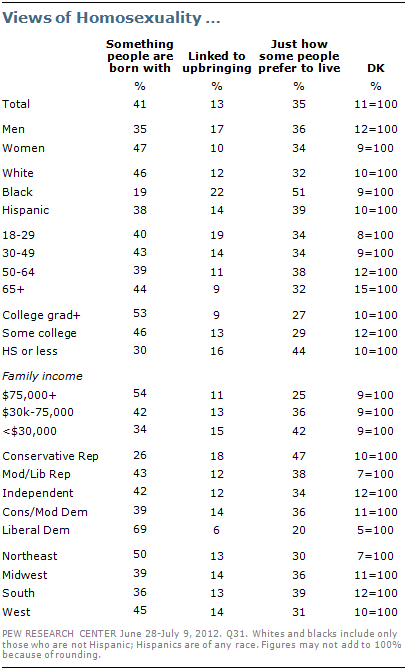
Hispanics are evenly divided on whether homosexuality is something people are born with (38%) or is just how some people prefer to live (39%), with only a minority (14%) saying it is linked to upbringing.
Blacks are far more likely than whites to say that homosexuality is how some people prefer to live (51% vs. 32% of whites). Just 19% of blacks say homosexuality is something people are born with, compared with 46% of whites.
While young people are more supportive of gay marriage than are older Americans, they are not any more likely to say that homosexuality is something that people are born with. Roughly four-in-ten across age groups, including 40% of those younger than 30, say that homosexuality is something that people are born with.
About half of white evangelicals (49%) believe that homosexuality is a personal preference, 24% say it is something that people are born with and 19% think it is linked to upbringing. Among black Protestants, about half (54%) say homosexuality is a personal preference, 18% say it is inborn, and 21% say it is linked to upbringing.
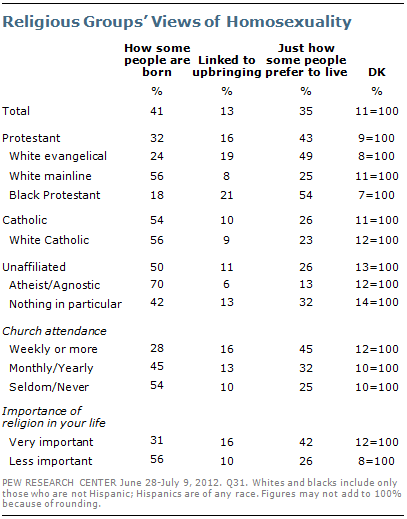
Among most other religious groups, the prevailing view is that homosexuality is something that people are born with. This opinion is especially common among atheists and agnostics, 70% of whom say that homosexuality is something that people are born with.
Can Homosexuality Be Changed?
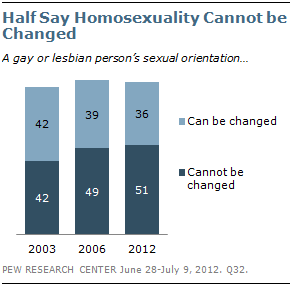
About half of Americans (51%) say that a gay or lesbian person’s sexual orientation cannot be changed. Fewer (36%) think that a gay person’s sexual orientation is something that can be changed.
Six years ago, four-in-ten people (39%) said that homosexuality can be changed, and about half (49%) said it can’t be changed. In 2003, the public was evenly divided, with 42% asserting that homosexuality can be changed and 42% saying it can’t be changed.
Slightly more than half of whites think that homosexuality can’t be changed (55%). Far fewer whites (32%) believe it can be changed.
The more common view among blacks (54%) is that it can be changed, with fewer (36%) saying that it cannot be changed. Hispanics are evenly divided on the issue, with 42% saying it can be changed, and 43% saying it cannot.

By a margin of two-to-one, Democrats say a gay person’s sexual orientation cannot be changed (61% to 30%); three-quarters of liberal Democrats hold that view, as do about half (52%) of conservative and moderate Democrats.
Republicans are evenly divided, with 45% saying that a gay person’s sexual orientation can be changed and 44% saying it cannot. About half of conservative Republicans (52%) say change is possible, compared with 31% of moderate and liberal Republicans.
The view that homosexuality can be changed is held by about half of white evangelicals (52%). Far fewer (35%) think it cannot. Similarly, a majority of black Protestants (58%), say homosexuality can be changed and only one-in-three (33%) say it cannot be changed.
The view that homosexuality cannot be changed is most common among white mainline Protestants and people who are atheist or agnostic. Among white mainline Protestants, 19% think that homosexuality can be changed, and 70% say it cannot be changed. Among atheists or agnostics, 17% say homosexuality can be changed and 76% say it is a fixed trait.

Among people who say religion is very important in their lives, slightly less than half (46%) say that homosexuality can be changed. Among those who say religion is less important, the balance of opinion is reversed. Fully two-thirds (68%) say it cannot be changed, while only 23% think it can be changed.
Among people who attend religious services at least weekly, about half (52%) say homosexuality can be changed. Far fewer weekly attenders (34%) say it cannot be changed. By contrast, 60% of people who attend religious services less than weekly say that homosexuality cannot be changed, while 27% say it can be changed.
Gay Marriage and Views of Homosexuality
Opinions about gay marriage are closely related to views about the nature of homosexuality. Fully three-quarters (76%) of people who believe homosexuality is something people are born with favor allowing gays and lesbians to marry legally. By contrast, most people who believe homosexuality is something linked to a person’s upbringing or who see it as a personal preference say gay marriage should not be legal.

The pattern is similar when it comes to whether homosexuality can be changed. Among the 51% of Americans who say a gay or lesbian person’s sexual orientation cannot be changed, most support gay marriage, by a 69% to 26% margin. Among the 36% who say homosexuality can be changed, most oppose gay marriage, by a 65% to 26% margin.
Over the past six years, support for gay marriage has risen among those who say homosexuality is something some people are born with (from 59% to 76%) and among those who say it is something linked to a person’s upbringing (from 12% to 25%). There has been no significant change among those who say homosexuality is a preference.
Photo Credit: RNS/istockphoto